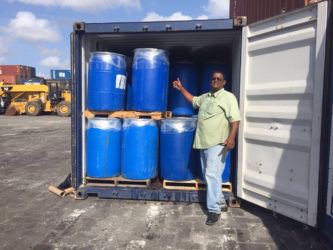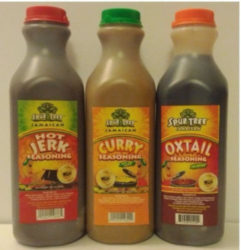Resident in Jamaica for the past 35 years, Mohan Jagnarine says he is seeing benefit in collaborating with local farmers to secure valuable raw material for his successful agro-processing enterprise in Kingston.
At a time when the National Agricultural Research and Extension Institute (NAREI) says that local agricultural production is “in a good place,” farmers are becoming increasingly challenged to seek out external markets in the face of decidedly modest local ones.
Earlier this week Stabroek Business caught up with Jagnarine as he was in the final stages of overseeing the preparation, packaging and shipping a consignment of more than 38,000 pounds of ‘pepper mash’ to Jamaica. The mash is destined for the Kingston processing plant of Spur Tree Spices where it will be pressed into service as raw material for some of the range of Caribbean spices and condiments produced by Spur Tree. Eighty per cent of Spur Tree’s products are marketed overseas.

Pepper, among other fruit and vegetables, are vital to Jamaica’s highly lucrative agro-processing sector, a major money-earner, particularly in the North American market. Jagnarine’s targeting of farmers here as one source for his own pepper supplies coincides with a recent call in Jamaica for increased pepper production, though he stresses that there is no connection. His initiative, he says, comes on the back of discussions with local officials that have been ongoing for some while and which have a bearing on local farmers maximizing export opportunities.
His local suppliers are two large farming enterprises located on the Soesdyke-Linden highway. Sealing deals with the local farmers, Jagnarine told Stabroek Business, had to be preceded by discourses on “quality and price,” among other things. With regard to quality, he explains, the considerations of “traceability” addressed in the United States’ 2010 Food Safety Modernization Act (FSMA) are now fully applicable to food exports to the United States from Jamaica. Accordingly, Spur Tree is compelled to meet the requirements set out in the provisions of the FSMA.
To his complete satisfaction, the two local farmers that provide pepper for his factory are meeting the conditions that allow his products to satisfy the requirements of the FSMA. Jagnarine believes that the portents for the local agricultural sector, insofar as meeting international safety and health standards is concerned could remain encouraging as long as their efforts are complemented by commensurate market access.

After the pepper is cultivated and harvested it is transported from the farms to AMJ Agro Processors, a processing facility partially owned by Jagnarine and situated at Hope Estate on the East Coast Demerara. There, the fruit undergoes partial processing designed to preserve it for the journey to Jamaica.
Support for what—as far as this newspaper is aware—is a unique example of a collaborative activity involving local producers and an external manufacturer, has come from NAREI, the specialist local organization responsible for spearheading agricultural research and extension activities for productivity enhancement. NAREI’s Chief Executive Officer Dr Oudho Homenauth says he believes Jagnarine’s initiative can, in more ways than one, contribute to the local agricultural sector and to the Guyana economy. “Apart from the export market opportunity what the initiative also does is to provide employment in the sector. It would be encouraging to see that kind of initiative multiplied,” he says.
Spur Tree Jamaica has been manufacturing a range of seasonings and condiments including jams and jellies, pepper sauce and curry paste since 2006. Its popular ‘all in one’ seasonings and sauces comprise a mix of Jamaica’s popular scotch bonnet pepper, thyme, scallion and pimento.
The company’s signature jerk pork seasoning uses a traditional recipe that is not only widely popular in Jamaica but which has also played a role in branding the Spur Tree name in the Jamaican diaspora.
While the company has long been a household name in Jamaica, supplying the local food service industry with catering-size packets and making inroads into several of Jamaica’s top hotels and restaurants, Spur Tree Products has now made marked inroads on the North American market.
The export potential of the Guyana food manufacturing sector—as far as the major markets in the United States are concerned—continues to be challenged by the stringent requirements of the FSMA. But Jagnarine says Spur Tree has had no choice but to invest in the technology necessary to attain those standards. “It is one of the challenges that I have had to face and I have had to make a great deal of investment in the technology necessary to get to that point,” he says.
There is, Jagnarine says, potential for future growth in the business collaboration between himself and local farmers. This time around he has been able to reach an agreement with Bonasika farmer Zaman Nazeer for the purchase of a quantity of limes. The two are hoping that there can be continuity to the existing arrangement and Jagnarine says he has not closed his mind to even further arrangements with farmers in the local agricultural sector.







